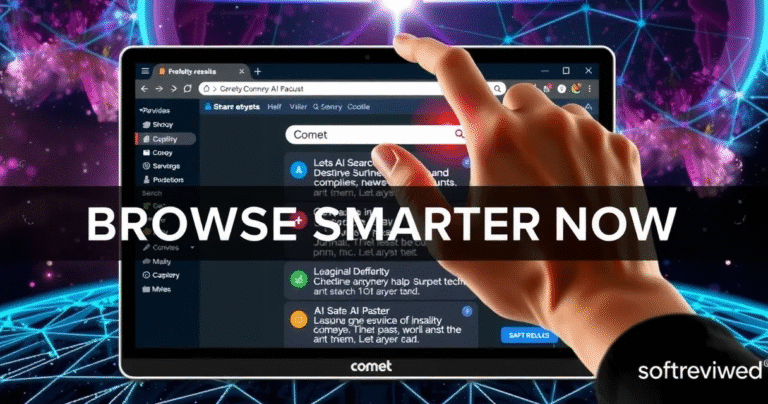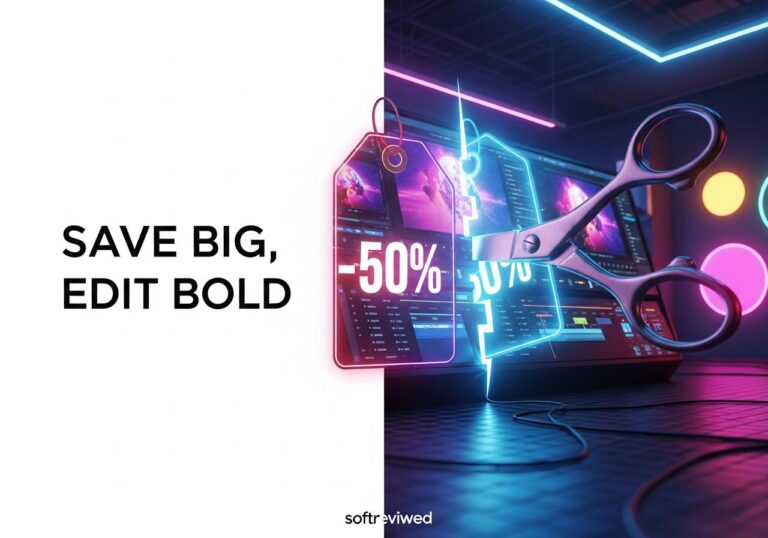Perplexity Browser: AI-First Web Experience
A revolutionary approach to web browsing with integrated AI capabilities and enhanced privacy features
🤖 AI-Powered Assistant Integration
Built-in AI assistant automatically summarizes content, manages tabs, and books meetings. Appears as a convenient sidebar to analyze webpage content and provide contextual assistance.
🔄 Chromium-Based Compatibility
Fully compatible with Chrome extensions and offers one-click migration of settings and bookmarks, ensuring a seamless transition for users switching from other browsers.
🔍 Perplexity Search Default
Pre-installed AI search engine prioritizes AI-generated summaries over traditional results, delivering more relevant and concise information directly in your search experience.
🔒 Enhanced Privacy Controls
Features strict tracking mode for sensitive data and local processing capabilities to protect user information, giving you more control over your digital footprint.
🛡️ Native Ad Blocker
Blocks ads without requiring third-party tools or extensions, offering a cleaner browsing experience than Chrome’s increasingly limited ad-blocking capabilities.
🌟 Exclusive Launch Availability
Initially available to Perplexity’s $200/month Max subscribers and selected invitees from the waitlist, creating a premium early-access experience.
Perplexity’s Comet Crashes the Browser Party: A New AI-Powered Way to Surf, or Just More Hype?
The web browser, a tool so fundamental to our digital lives that we barely think about it, is suddenly the hottest battleground in tech. For decades, the formula has been simple: you type, you search, you click through endless blue links, and you manage a chaotic mess of tabs. But what if your browser could do the thinking for you? That’s the audacious premise behind Comet, the new AI-powered web browser from search-engine-that-could, Perplexity.
Launched to a select group of subscribers, Comet isn't just another Chrome skin. Perplexity describes it as a shift "from navigation to cognition." It promises to transform your browsing sessions into seamless, intelligent conversations where an AI agent anticipates your needs, summarizes content on the fly, and even takes action on your behalf. This move positions the NVIDIA and Jeff Bezos-backed startup directly against giants like Google Chrome and Microsoft Edge.
But this ambitious vision comes with a hefty price tag and a swirling cloud of controversy. With an exclusive initial release for a $200/month subscription tier and lingering questions about data privacy, Perplexity is making a high-stakes bet. Is Comet the revolutionary leap that will finally kill the tab-hoarding habit, or is it a privacy-eroding gimmick for the wealthy? Let's unpack what’s really going on.
Beyond the Ten Blue Links: What Is Perplexity Comet and Why Does It Exist?

For years, Perplexity has been carving out a niche as an "answer engine," providing direct, sourced answers to complex questions, positioning itself as a more accurate and transparent alternative to conversational AI chatbots. With Comet, the company is moving beyond being a destination website and aiming to become the very vehicle you use to navigate the entire internet.
From "Answer Engine" to Your Digital Co-Pilot
At its core, Comet is a web browser built on Chromium, the same open-source foundation as Google Chrome and Microsoft Edge. This means it supports familiar features and, crucially, your favorite Chrome extensions. But the similarities end there. The default search engine is, unsurprisingly, Perplexity's own AI, which provides curated, AI-generated responses with citations instead of just a list of links.
The goal, according to CEO Aravind Srinivas, is to create an experience that feels less like manually operating a machine and more like having a thought partner. “We built Comet to let the internet do what it has been begging to do: to amplify our intelligence,” the company stated in its launch announcement.
It’s Not Just a Browser, It’s an “Agentic” Partner
The key buzzword Perplexity is using to describe Comet is "agentic." This means the browser is designed to be an active agent that can perform tasks for you, not just a passive window for viewing websites. It’s a concept that other companies, including OpenAI, are also chasing.
Think of it like this:
- 📌 Traditional Browser: You search for a restaurant, open multiple review tabs, a map tab, and a booking tab, then manually piece everything together.
- 📌 Agentic Browser (Comet): You ask, "Find a well-rated Italian restaurant near me for 8 PM tonight and book a table for two." The browser agent handles the multi-step process for you.
This shift from passive consumption to active delegation is the fundamental idea driving Comet's design.
So, How Does This AI Browser Actually Work?
Comet’s intelligence is centered around its integrated AI assistant, which lives in a sidebar and is constantly aware of the content on your screen. This "context-aware" functionality is what separates it from simply having a chatbot pinned to your browser.
The "Comet Assistant": Your Always-On Research Partner
The Comet Assistant is the brain of the operation. Because it can "see" the webpage you're on, you can ask it questions directly related to the content without copying and pasting. For example, you could be on a complex technical document and highlight a section to ask for a simplified explanation, or you could ask it to summarize a long YouTube video you're watching.
This assistant is accessible throughout the browser, aiming to remove the friction of switching between different apps and tabs to get things done.
🚀 From Passive Searching to Proactive Doing
Where Comet gets truly ambitious is in its ability to take action. The AI agent can connect to your other services, like Gmail, to perform tasks that cross application boundaries.
Some of the agentic tasks Perplexity has highlighted include:
- ✅ Managing your day: Summarizing your calendar, finding important emails, and briefing you on your schedule.
- ✅ Automating web tasks: Comparing products across different e-commerce sites, booking meetings, or even purchasing an item you forgot.
- ✅ Organizing your workspace: Intelligently grouping research tabs into collections or closing tabs you haven't touched in days.
This level of automation is what Perplexity hopes will define the next generation of browsing, making it feel more like a conversation and less like a chore.
The Battle for Your Desktop: How Comet Stacks Up
Perplexity is not the first to inject AI into the browser. Microsoft has been aggressively integrating its Copilot AI into Edge, and startups like The Browser Company are also rethinking the experience with their own AI-first browser, Dia. So how does Comet compare?
Perplexity Comet vs. The Competition: A Quick Look
| Feature | Perplexity Comet | The Browser Company Dia | Microsoft Edge with Copilot |
|---|---|---|---|
| Core Concept | Agentic browser that acts as a proactive assistant. | Minimalist, AI-first browser focused on "vibe browsing." | Traditional browser with a powerful, integrated AI sidebar. |
| Key AI Strength | Performing multi-step tasks and actions across tabs and apps. | Simplified, clean interface with custom "skills" for shortcuts. | Deep integration with Windows and Microsoft 365 services. |
| Unique Features | Action-oriented AI agent, voice mode, selectable AI models (Pro/Max). | Custom slash commands for quick actions, simple UI. | Page summary, content creation, deep integration with OS. |
| Underlying Tech | Chromium | Chromium | Chromium |
| Early Reviews | Powerful but can feel "clunky" in early versions. | Clean and snappy interface, but "skills" are still developing. | Robust and feature-rich, but can feel bloated to some. |
Early hands-on reviews suggest Comet's strength is its ambition to do things, whereas Dia excels in its clean, simple user experience. Meanwhile, Edge with Copilot remains a strong contender, especially for users already embedded in the Microsoft ecosystem.
The Elephant in the Room: The $200/Month Price Tag and the Privacy Debate
For all its futuristic features, Comet's launch is dominated by two major talking points: its exclusive price and a firestorm over user privacy.
Introducing Perplexity Max: The All-Access Pass
Initially, Comet is only available to subscribers of a newly launched tier called Perplexity Max. The price? A steep $200 per month (or $2,000 annually). This plan is aimed squarely at professionals, researchers, and power users who can justify the cost.
In addition to Comet access, the Max plan includes:
- ➡️ Unlimited access to Perplexity Labs for creating reports and spreadsheets.
- ➡️ Priority access to frontier AI models from partners like OpenAI and Anthropic.
- ➡️ Dedicated infrastructure and faster customer support.
Perplexity says a broader, invite-only rollout for other users will happen over the summer via a waitlist on the official Perplexity Comet website. However, the high entry price has raised eyebrows and positioned Comet as a luxury tool, at least for now.
🤔 "We Want to Get Data": The Controversy and the Clarification
Months before Comet's launch, CEO Aravind Srinivas sparked a significant backlash during a podcast interview. He suggested that a key reason for building a browser was to "get data even outside the app to better understand you," including browsing habits, purchases, and travel plans, to potentially build user profiles for targeted ads.
The comments drew immediate criticism from privacy advocates. However, Srinivas later clarified his remarks, stating that he was answering a hypothetical question about how ads could work in AI products. He emphasized that cracking "memory and personalization" is essential for any functional AI assistant, regardless of advertising.
Srinivas assured users that they would have control over their data. "Every user will be given the option to not be part of the personalization (with zero ads even) if they don't want it," he stated on X (formerly Twitter). "It's up to them to make a trade off between utility and privacy.” Despite the clarification, the incident has placed Perplexity's data practices under intense scrutiny as it rolls out a tool with the potential for deep user insight.
Expert and User Chatter: Is Comet a Game-Changer or a Gimmick?
As with any disruptive new product, early opinions on Comet are sharply divided.
The Enthusiasts: "Vibe Browsing is Real"
Many early testers are impressed by Comet's agentic capabilities and its potential to transform research workflows. The term "vibe browsing" has emerged to describe the natural, conversational way users can interact with the browser, delegating complex tasks with simple commands.
One early reviewer on Medium noted, "Research workflows that typically require dozens of tabs and manual cross-referencing now happen in conversational flows." Others praise the cross-site context awareness, where the browser can recall information from previously viewed tabs to answer a new query.
The Skeptics: "Clunky" and Concerning
However, the launch hasn't been without criticism. Some users have described the initial version of Comet as "clunky" and less responsive than competitors like Dia. The high price of the Perplexity Max plan is a major barrier for many, with one Reddit user remarking, "If I wanted spyware I'd use Microsoft Edge and ask Co-Pilot to summarise everything. At least I wouldn't need to pay 200 dollars for that."
The privacy issue remains a top concern for many potential users, who are wary of giving a single company such a comprehensive view of their online activity, despite the company's assurances.
Where the Digital Compass is Pointing: What's Next for AI Browsers?
Perplexity's Comet is not an isolated event. It's part of a massive industry-wide push to embed AI into every facet of our digital lives. OpenAI is also rumored to be developing its own browser, and Google and Microsoft are in an arms race to make their existing browsers smarter.
The battle is no longer about rendering speed or features but about which company can build the most intelligent, seamless, and trustworthy cognitive assistant. These new browsers want to be more than just tools; they want to be operating systems for the web, capable of understanding your intent and executing on it. The long-term vision is an internet that works for you in the background, freeing you up from the manual, repetitive tasks that define browsing today.
Is Comet Your Next Browser? The Final Word (For Now)
Perplexity's Comet is a bold, ambitious, and deeply polarizing product. It offers a tantalizing glimpse into a future where our browsers are not just passive windows to the web, but active partners in our work and lives. Its agentic capabilities are genuinely powerful, and the idea of "vibe browsing" is compelling.
However, Perplexity is asking for a lot of trust—and for some, a lot of money. The company must overcome significant privacy concerns and convince users that its vision of an AI-powered web is worth the trade-offs. The browser wars have been reignited, but this time, the fight is for the future of thought itself. Whether Comet becomes a dominant force or a forgotten experiment will depend on whether it can prove its utility and, most importantly, earn the confidence of its users. To achieve this, Perplexity must navigate the complexities of data ethics and user trust, especially in the context of rapidly evolving technologies like perplexity cloudflare ai web scraping. By addressing these issues head-on and providing transparent solutions, the company can foster a loyal user base that feels secure in its innovations. Ultimately, success will hinge on its ability to transform potential skepticism into unwavering belief in its groundbreaking approach.







